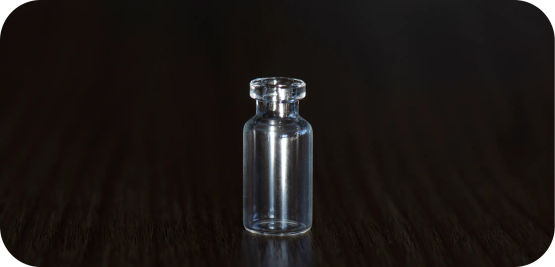(Download: Sterilization for Pharmaceutical Vials: Ensuring Safety and Scale in PDF by Medistri)
A pharmaceutical vial is a small container, typically made of glass or plastic, used to store and protect liquid, powder, or lyophilized (freeze-dried) pharmaceutical substances. These vials must be sterilized and sealed with a rubber stopper or a screw-on cap, often secured by a metal crimp or seal. They are commonly used for injectable medications, vaccines, or other substances requiring precise dosing. Vials ensure the contents are protected from contamination and maintain sterility until use.
The sterilization of glass pharmaceutical vials should be performed with a highly specific and well-designed cycle developed after studying all the critical parameters and their interconnections. The sterilization parameters used during this process depend primarily on the nature and design of the containers, closures, and packaging material.
A crucial prerequisite of terminal sterilization is to improve the aseptic manufacturing sterility assurance standard of pharmaceuticals without impacting pharmaceutical validity. Sterilization methods must deliver a Sterility Assurance Level (SAL) of 10⁻⁶ without influencing pharmaceutical validity.
Before sterilization, bioburden testing is performed. Once your products have been sterilized, Medistri performs bioburden testing, bacterial endotoxin (BET), biological indicator (BI) sterility, and EO residual analysis in our GMP-accredited laboratory in Switzerland, also certified with ISO 17025, to analyze and demonstrate the safety of your sterile medical device.
Once your products have been sterilized, Medistri performs bioburden testing, bacterial endotoxin (BET), biological indicator (BI) sterility, and EO residual analysis in our in-house GMP-accredited laboratory in Switzerland, also certified with ISO 17025, to analyze and demonstrate the safety of your sterile medical device.
Sterilizing a pharmaceutical vial is crucial to ensure the safety, quality, and efficacy of the medication it contains. Without sterilization, harmful microorganisms could contaminate the vial, posing serious risks to patient health, such as infections or adverse reactions.
Contamination can also compromise the integrity of the drug, reducing its effectiveness or causing unintended chemical changes. Sterilization safeguards the product throughout its shelf life, maintaining its purity and sterility, which is essential for compliance with regulatory standards and for protecting patient safety during administration.
To learn more about our Pharmaceutical Vials Sterilization Services, visit our website here or contact our team at contact@medistri.com.
— The Medistri Team
#Medistri
1. What is a pharmaceutical vial and why must it be sterilized?
A pharmaceutical vial is a small container made of glass or plastic designed to store sensitive drugs, vaccines, or lyophilized substances. Sterilization ensures these vials remain free from microorganisms, maintaining product safety, efficacy, and compliance throughout their shelf life.
2. Why is sterilization critical to maintaining drug quality and patient safety?
Without sterilization, contamination can lead to microbial growth or chemical degradation of the product. This compromises drug integrity and increases the risk of infection or adverse reactions during administration.
3. How are pharmaceutical vials sterilized effectively?
Sterilization cycles are carefully designed after studying material properties, container geometry, and closure systems. By adjusting parameters such as temperature, pressure, and exposure time, the process achieves the required Sterility Assurance Level (SAL) of 10⁻⁶ without altering product validity.
4. When are analytical tests performed during the sterilization process?
Bioburden testing is performed before sterilization to assess microbial load, followed by sterility verification and endotoxin testing afterward. These analyses confirm the effectiveness of the process and ensure that each batch meets strict quality and regulatory standards.
5. How does Medistri ensure the reliability of vial sterilization and testing?
Medistri conducts all sterilization and testing procedures in its GMP-accredited, ISO 17025–certified laboratory in Switzerland. Through validated sterilization cycles and comprehensive post-process analyses, Medistri ensures full compliance, traceability, and product safety for pharmaceutical manufacturers.
